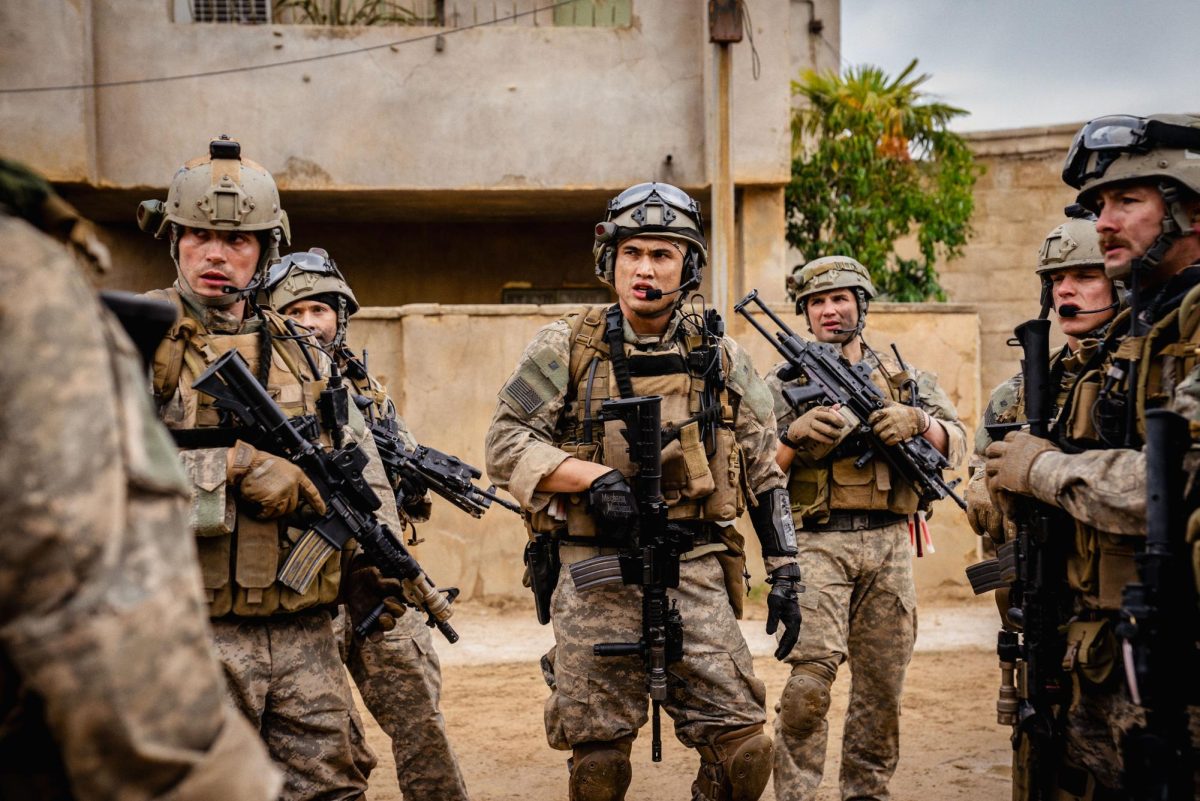4.0 out of 5.0 stars
“Warfare,” co-directed by Alex Garland and Ray Mendoza, is a realistic war movie that appears to capitalize off of A24’s recent success with “Civil War.” It is a cinematic representation of Mendoza’s memory of a major event while serving in Iraq.
Interestingly, the actors chosen to star in the film are all popular with a generation who were very young when the Iraq War began. When the cast of “Warfare” was announced online, it received immediate buzz for its casting choices of Kit Connor and Will Poulter, who have grown into potential stars. While they do put on strong performances, “Warfare” lives and dies on the acting of D’Pharaoh Woon-A-Tai as Mendoza. Woon-A-Tai is sensitive and vulnerable while still being the closest thing this film has to a hero, managing to stay focused while the rest of the characters were frozen in fear by the attacks.
This is as small a scale as a war film can be because it does not engage with the politics of the Iraq War. For those who need their war films to be about ideology and history, this isn’t the movie to watch. It is war through the eyes of a small group of soldiers on a mission from hell. “Warfare” is not interested in representing the Iraq War, it is interested in representing warfare.
Removing “Warfare” from the specificity of the Iraq War depoliticized it and therefore removed any conversation about whether or not this war was just. The focus is not on the big players in war rooms or the motivations for a country to go to war, but instead on what battle actually looks like to those who experience it. It puts the focus on the soldiers involved and the importance of their sacrifices.
The cast is full of side characters in the platoon, like Jake (Charles Melton) and Elliot (Cosmo Jarvis), who stand as interesting additions despite their limited screen time. Melton’s appearance as Jake is brief but grants him a rare gravitas, considering his most renowned roles so far have presented him as either buffoonish in “Riverdale” or abused in “May December.” Jarvis as Elliot feels extremely human. His character does not have a strong personality or motivation, but Jarvis manages to imbue his character with little moments that make him seem more like a real person, like the way he jokes around with friends while waiting to shoot someone or the way he tries to steel himself against pain. He helps the audience buy into the reality of the story.
The rest of the cast is strong, but the matching uniforms and grime on their faces cuts down their individuality, leaving the majority of their performances lost in the action. While certain actors are memorable, the characters they play just blend into each other. There is no real difference between one soldier or the other, which could be a commentary on the mechanical nature of war and its apathetic treatment of human beings.
“Warfare” is a successfully visceral experience. This movie feels like the famous first few minutes of “Saving Private Ryan,” but extended to feature length. The sound production is excellent, maintaining its power throughout and heightening every moment. The bombs never stop inducing flinches. The gore and roaring tsunami of debris leave both the characters and the audience ducking for safety and shrinking from terror. The gunshots are so much louder than gunfire in usual action films for a far more realistic representation.
While the sound is the most impressive part of the film, it is supported by the camerawork. The visuals play with focus in order to better place the audience in the minds of the soldiers. Most of the shots are purposefully disorienting, except for close-ups of characters trying to process their internal strife.
The characters are motivated by following orders and surviving. It does not have the tragic beauty of “All Quiet on the Western Front,” the noble motivations of “Saving Private Ryan,” the power fantasy of “Apocalypse Now” or even the stunning visuals of “Civil War.” This film is plain and dirty. The soldiers do not cry beautifully and wail to the heavens about the end of the world. They scream hysterically, mutter incoherently and twitch on blood-soaked floors while waiting for help. Every artistic decision made in “Warfare” comes together to make this the most inglorious depiction of war in a film, and in doing so, this film manages to be one of the most important depictions of war.




















